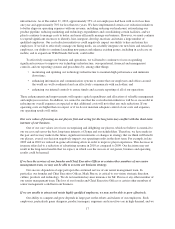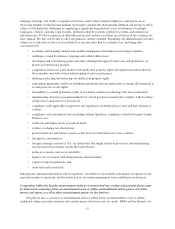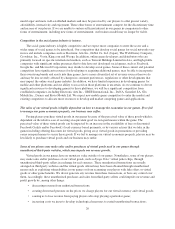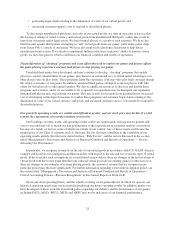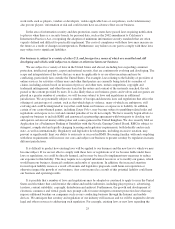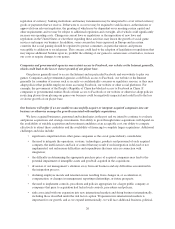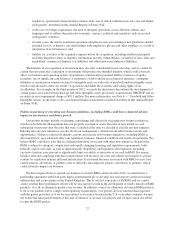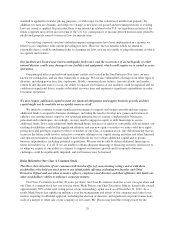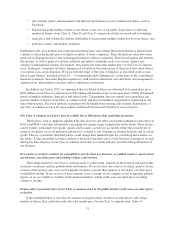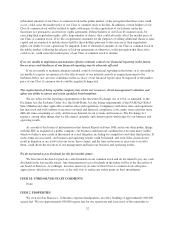Zynga 2012 Annual Report Download - page 34
Download and view the complete annual report
Please find page 34 of the 2012 Zynga annual report below. You can navigate through the pages in the report by either clicking on the pages listed below, or by using the keyword search tool below to find specific information within the annual report.regulation of currency, banking institutions and money transmission may be interpreted to cover virtual currency,
goods or payments that we receive. If that were to occur we may be required to seek licenses, authorizations or
approvals from relevant regulators, the granting of which may be dependent on us meeting certain capital and
other requirements and we may be subject to additional regulation and oversight, all of which could significantly
increase our operating costs. Changes in current laws or regulations or the imposition of new laws and
regulations in the United States or elsewhere regarding these activities may lessen the growth of social game
services and impair our business. In addition, some concern has been expressed in Europe and in certain
countries that social gaming should be regulated to protect consumers, in particular minors and persons
susceptible to addiction to social games. This concern could lead to the adoption of legislation or regulations that
may impose additional burdens upon us, prohibit the offering of our games to certain users or territories, increase
our costs or require changes to our games.
Companies and governmental agencies may restrict access to Facebook, our website or the Internet generally,
which could lead to the loss or slower growth of our player base.
Our players generally need to access the Internet and in particular Facebook and our website to play our
games. Companies and governmental agencies could block access to Facebook, our website or the Internet
generally for a number of reasons such as security or confidentiality concerns or regulatory reasons, or they may
adopt policies that prohibit employees from accessing Facebook, our website or other social platforms. For
example, the government of the People’s Republic of China has blocked access to Facebook in China. If
companies or governmental entities block or limit access to Facebook or our website or otherwise adopt policies
restricting players from playing our games our business could be negatively impacted and could lead to the loss
or slower growth of our player base.
Our business will suffer if we are unable to successfully acquire or integrate acquired companies into our
business or otherwise manage the growth associated with multiple acquisitions.
We have acquired businesses, personnel and technologies in the past and we intend to continue to evaluate
and pursue acquisitions and strategic investments. Our ability to grow through future acquisitions will depend on
the availability of suitable acquisition and investment candidates at an acceptable cost, our ability to compete
effectively to attract these candidates and the availability of financing to complete larger acquisitions. Additional
challenges and risks include:
• significant competition from other game companies as the social game industry consolidates;
• the need to integrate the operations, systems, technologies, products and personnel of each acquired
company, the inefficiencies and lack of control that may result if such integration is delayed or not
implemented, and unforeseen difficulties and expenditures that may arise in connection with
integration;
• the difficulty in determining the appropriate purchase price of acquired companies may lead to the
potential impairment of intangible assets and goodwill acquired in the acquisitions;
• diversion of our management’s attention away from our business and any difficulties encountered in
the integration process;
• declining employee morale and retention issues resulting from changes in, or acceleration of,
compensation, or changes in management, reporting relationships, or future prospects;
• the need to implement controls, procedures and policies appropriate for a larger public company at
companies that prior to acquisition had lacked such controls, procedures and policies;
• risks associated with our expansion into new international markets and doing business internationally,
including those described under the risk factor caption “Expansion into international markets is
important for our growth, and as we expand internationally, we will face additional business, political,
26



